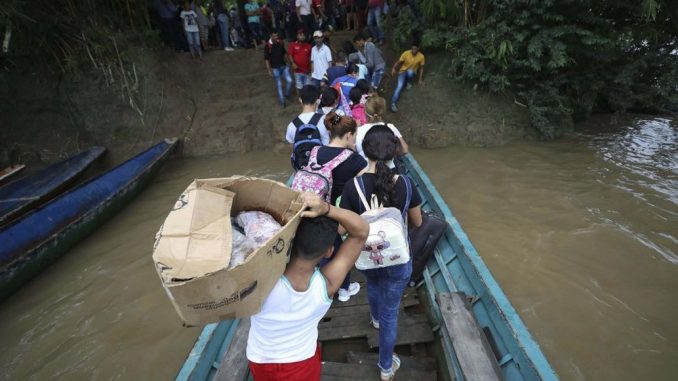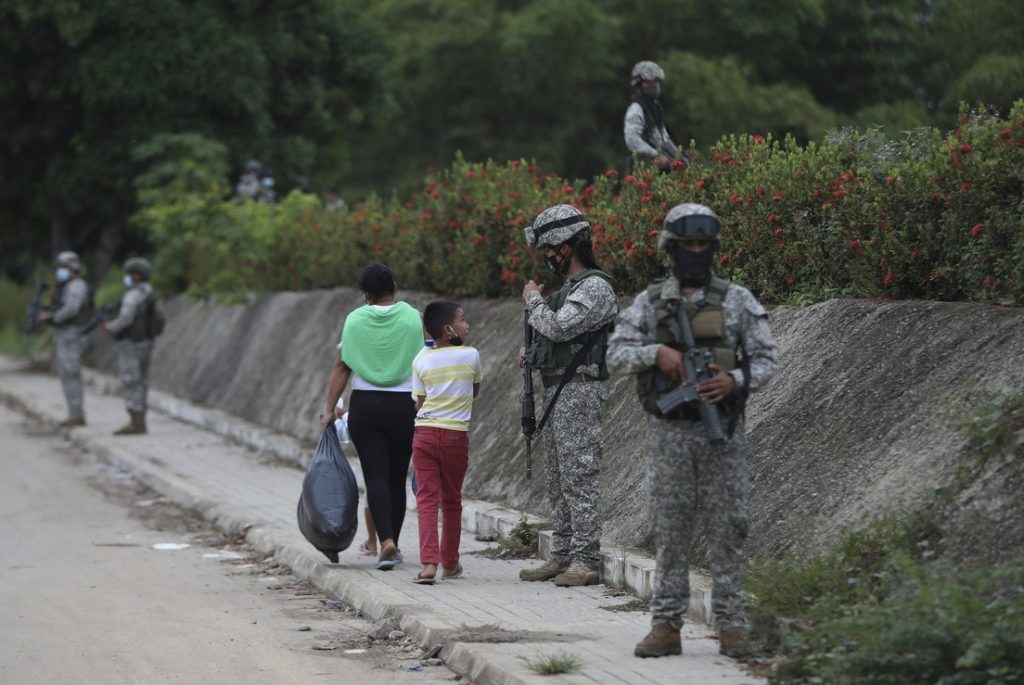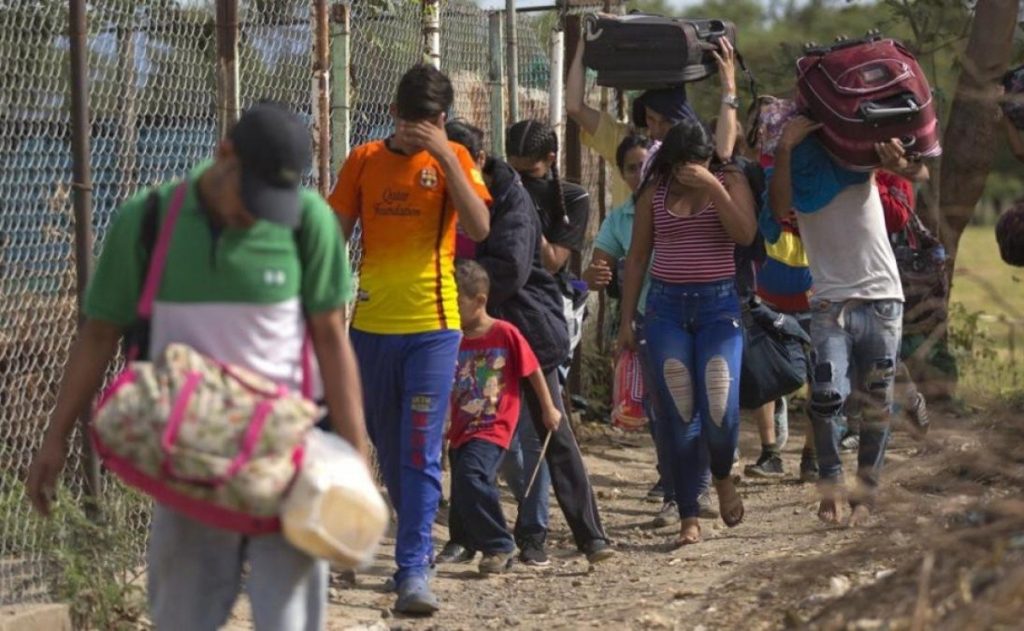
The year 2022 began with a strong onslaught not only economically, but with a wave of violence that directly affects the working class and popular sectors. The events in Arauca, Cauca, the border with Venezuela, the assassination of social leaders, political persecution, the so-called “judicial false positives” and the deepening of gender-based violence, end up being landscape in the context of an electoral juncture that makes the escalation of violence look like just another news item in the Colombian showbiz. On the border between Colombia and Venezuela, violent events have occurred, specifically in Arauca in Colombia and Puerto Paez in the State of Apure, Venezuela. More than twenty people have been killed and a large number of inhabitants have been displaced from their territories. Both sides of the Colombian-Venezuelan border, in the Arauca area, are territories where military, guerrilla and paramilitary operations are being carried out, affecting the lives and property of the Colombian and Venezuelan population living in these areas. The armed factors wage their confrontations without regard for the interests, security and lives of the people. Behind all this there are also economic operations of an illicit nature (drug trafficking, smuggling, kidnapping industry, dispossession and appropriation of land, etc.).

There are contradictory versions of recent events. Even among official Colombian sources, which attribute them to alleged clashes between an ELN front and a sector of FARC dissidents that was not “pacified” after the peace negotiations with the Colombian government of Santos. Some alleged combats or operations, according to these sources, would have taken place in Venezuela and others on the Colombian side, bringing a strong militarization of the border involving the armies of the two countries. In the Colombian case, it is estimated that it also involves agents of the United States, a power that maintains its own military bases in Colombia and would act with the Colombian armed forces in the framework of its adhesion to NATO.
In an alleged communiqué from the FARC dissidents, they point out to the ELN guerrilla and the Nueva Marquetalia led by Iván Márquez of having a joint alliance with drug trafficking gangs and the Colombian army, declaring war on them. Investigations by the Colombian Attorney General’s Office conclude that in reality there was no struggle, but rather villagers were taken from their homes and killed by hired killers at very close range, under the accusation of being guerrilla collaborators.
Among the most recent events is the armed takeover of La Gabarra, a Venezuelan town that is part of a communal city in Apure state, by ELN combatants, to which the organized community and a communiqué from the Bolivar y Zamora Revolutionary Current (of Venezuela), responded that they are declaring themselves in “peaceful resistance”, while battalions of the Bolivarian Armed Forces are mobilizing on the Colombian-Venezuelan border. Some analysts speak of a kind of “hybrid war” of “low intensity” that they assure is being developed by the Colombian army together with US military forces, as a test to maintain military pressure on the government of Nicolás Maduro on the border with Venezuela and generate a kind of “Contra” like the one that used the territory of Honduras to attack Nicaragua.
Duque’s government in Colombia has responded to the situation in which the Arauca massacres are taking place, with a deepening of militarization, which was already used by the Uribe government, giving the problems an “internal war” treatment, with the deployment of two battalions, along with helicopters, airplanes and drones, which adds up to an approximate 7,425 military personnel for a population of a little more than 295,000 people. On the contrary, it multiplies the abuses and pushes the displacement of the inhabitants of the territory with greater intensity , who have to abandon villages, towns, lands and goods, fleeing from the war scenario.
Social and humanitarian organizations in the area have denounced that, while this escalation of militarization is taking place, events such as the throwing of explosives against the installations of the community company Acueducto, Alcantarillado y Aseo de Saravena, and leaders of the social and popular Araucanian movement are receiving death threats, in addition, they complain that “the authors of this type of aggressions are allowed” to roam freely in the municipalities” (according to a communiqué from the Joel Sierra Human Rights Foundation).
Popular sectors and organizations perceive that the purpose of the militarization is not really to resolve the situation affecting the rights and security of the people or to avoid the forced displacement of the inhabitants, but rather that what is underway is mainly a military operation aimed at ensuring the occupation and control of territories that were dominated by the guerrillas before the agreement with sectors of the FARC and in which other guerrilla groups also operated, as well as paramilitaries linked to the army and the government or criminal groups related to the illicit trafficking of drugs or other products. But the rights of the people are trampled on in the same way and they continue to be victims of armed conflicts and disputes over economic interests between the Colombian State, groups and individuals who do not take into account or respect in the least the democratic and human rights of the inhabitants. A similar logic is followed by members of the military forces acting on the Venezuelan side, who have also been accused by the people of practicing “false positives” and executing massacres.

In these confrontations, economic and military factors seem to have more weight than political and social elements. It is known that, for years, drug trafficking has become one of the financing mechanisms of the guerrillas that dispute the predominance of the zone (both in Colombia and Venezuela), which has caused their degeneration, diverting them from any genuine revolutionary demands and giving them a reactionary character in the face of the working class and popular sectors, as the latest events in Arauca are demonstrating once again. Among the military there are also those involved in these activities.
In the case of Colombia, it is necessary to see the context in which all these events are taking place, since it has just closed the year 2021 with an enormous social explosion, which is part of a whole advance of the class struggle at world level, and which continues to show signs of the crisis of Uribism and its current genocidal government, that of Iván Duque. The outbreak put the government in check and managed to crack even more the Uribist regime of Duque, by temporarily rolling back the tax, pension and labor reforms.
But the uprising did not succeed in defeating the regime, due to the conciliation policies of the bureaucratic and reformist sectors of the National Strike Committee (CNP) and the lack of an organized and correctly led working class, which would drive the struggle in the streets and could give a second breath to the natural wear that affected the sustainability and escalation of the social movement.
In these circumstances, the response of the Colombian government to the social mobilization and the struggle in the streets was the deepening of State Terrorism, through its repressive forces, leaving a trail of death and repression in the main cities throughout more than two months of struggle and resistance.
The surrender of the leadership of the struggle allowed the regime to readjust and prepare a counter-offensive in retaliation to the social outbreak and to those who fight, expressed in judicial set-ups, political persecution and selective assassinations, which has coincided with a series of massacres that have taken place in different regions of Colombia.
This is reflected in reports from social and human rights organizations, such as the latest report from the NGO INDEPAZ (https://indepaz.org.co/cifras-de-la-violencia-en-las-regiones-2021/): in the context of the April 28 outbreak, at least 79 people. were killed by the repressive forces, 92 victims of ocular violence, 35 victims of sexual violence, 4. 687 aggressions, 2,005 arbitrary detentions, 833 repressive interventions and 1,661 cases of physical violence by the repressive forces; a balance of State Terrorism in the midst of the social outburst that demonstrates how this regime has, as its main instrument of response, the repressive forces combined with paramilitary actions in the face of any mobilization.
Furthermore, according to this same report, the year ended with 96 massacres perpetrated, leaving 335 people murdered; the assassination of 195 leaders and defenders of human rights; 48 ex-combatants murdered; and an endless number of judicial set-ups with political prisoners who are still held in detention centers being legally prosecuted..
All this reveals the authoritarian and right-wing Bonapartist character of the current Colombian government and this regime to stop the struggle and the organization of the working class and popular sectors. The only way out is mobilization and class organization.
In the Venezuelan case, the scenario of confrontations, guerrilla and military operations in border areas of both nations, deepens the issue of the displaced, which is added to that of the massive migration of Venezuelans to Colombia or in transit to other countries of Latin America, product of the terrible socio-economic situation they suffer in Venezuela, both because of the blockade and imperialist sanctions and the anti-worker and already openly counterrevolutionary policies of the government of Nicolás Maduro.
The population is the victim of the military actions, of the armed movements that are imposed against their will, completely disrupting their lives, as well as the distortions generated by the combination of drug trafficking, smuggling, cattle rustling, criminal gangs that traffic what is extracted by mining… where the mafias, the guerrillas and the armed forces of our countries are mixed.
The border situation is used by the United States and its Colombian ally as an excuse to install military pressure on Venezuela, in the framework of the geopolitical conflict with the Maduro government, where the military has a fundamental weight and is increasingly linked to economic interests and Chinese and Russian influence, which upset the desired balance of its Latin American “backyard”. And this, at the same time, is used by the Venezuelan government and the civil and military bureaucracy, as an excuse to justify the policies imposed on the population, undermining all the achievements of the Bolivarian revolution, and giving cover to particular interests on the border. All this is further complicated by one of the latest events, the ELN attack on police and military installations, including US bases in Colombia, which will undoubtedly bring the consequence of a counter-offensive.
Based on this perception and analysis of the situation on the Colombian-Venezuelan border, the organizations Impulso Socialista de Colombia and Marea Socialista de Venezuela, as part of the International Socialist League (ISL), from our vision and with our principles of commitment to the working class and the popular sectors of our countries, we pronounce ourselves in favor of:
End the war against the Colombian and Venezuelan people wherever it comes from!
Destitution, trial and punishment for the military and police leadership that gave the order to assassinate, displace and harass the Araucanian population. Immediate dismissal of Diego Molano at the head of the Ministry of Defense, of Luis Fernando Navarro Jiménez commander general of the Armed Forces, Eduardo Enrique Zapateiro commander of the army, Eduardo Mora López commander of the XVIII brigade of the army, and other military authorities who have determined and carried out the order of the genocidal government to perpetuate the war against the Araucanian people.
Repudiation and immediate cessation of the massacre, selective assassinations and forced displacement of the Araucanian population perpetrated by both the repressive forces and the guerrillas in dispute. That the assassinations and harassment by the guerrillas cease, that they not put their economic interests above the Araucanian people’s need for peace and permanence in the territories. That the Colombian government withdraw its military advance, which until now has been completely insufficient to stop the unleashed war, and advance in a concerted way with the Araucanian people and the guerrillas, the only way to stop this conflict. The democratic will of the local populations must be above all else.
3. Total rejection of U.S. imperialist interference in Arauca by means of troops, technical or military support, as well as any attempt at imperialist interference in Venezuela with the excuse of the current conflicts on the border. We reject the agreement that Colombia has with NATO and any intervention of imperialist organizations in Colombia and Venezuela.
4. We reject any military operation that under the excuse of counterinsurgency represses, displaces and kills peasants and settlers.
5. No U.S. military bases in Colombia and no to the establishment of military bases of any power in either country. In particular, rejection of the advancement of the military base in Arauquita, Arauca that social and human rights organizations have been denouncing.
6. It is necessary to recognize the right of the Colombian people to fight to remove the imperialist bases from their territory, but this cannot be a unilateral action that exposes the popular sectors as victims affected by the consequences. The road we must defend to remove the bases is the massive mobilization of the Colombian people to disavow their presence in the territory and impose their dismantling, all this in the framework of the struggle for a change of government, towards a government of the workers and the people of Colombia.
7. In the same way we express our rejection of Russia’s insinuations and Maduro’s tacit acceptance of the possibility of the emplacement of Russian arms and bases in Venezuela, which involves us more in the framework of the geopolitical-economic-military disputes of the great imperialist powers of the world.
8. We call on the social, political, popular trade union, youth and human rights organizations to take to the streets again and to show solidarity with our brother people on the Colombian-Venezuelan border. Let us prepare days of resistance against the genocidal government in rejection of its policies of state terrorism.
9. Let us fight in our countries for a true socialist revolution, that gives power to the workers and popular sectors, with a political regime of workers’ and popular democracy, without bureaucracies or authoritarianism, with full predominance of an economy with social property at the service of the people, and that historically opens the road towards the solidarity and cooperative integration of our countries, without fratricidal wars and without any imperialist domination over our nations.
Impulso Socialista (Colombia) and Marea Socialista (Venezuela), sister organizations of the International Socialist League (ISL).








